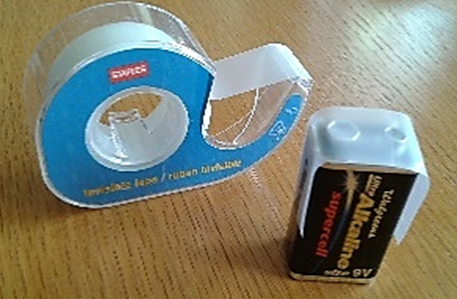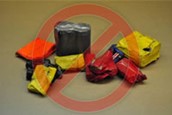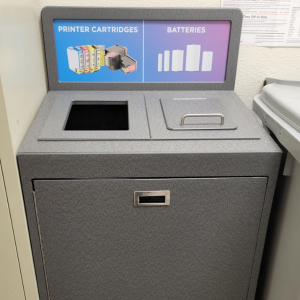
S&RM and Sustainability have teamed up to bring the campus a new battery recycling program.
Old batteries can not be disposed in trash or household recycling collection bins intended to receive other non-hazardous waste and/or recyclable materials: it is prohibited by law.
For questions, please email risk@csustan.edu.
Resources:
- Lithium-Ion Battery Safety
- Seguridad de las baterías de ion de litiode litio
- E-Bike and E-Scooter Safety
What is Universal Waste?
Universal wastes are hazardous wastes that were determined to pose a lower immediate risk to people and the environment compared to other hazardous wastes. These universal wastes are widely produced by households and many different types of businesses.
Universal waste batteries include rechargeable nickel-cadmium batteries, silver button batteries, mercury batteries, small sealed lead acid batteries (burglar alarm and emergency light batteries), most alkaline batteries, carbon-zinc batteries, and any other batteries that exhibit a characteristic of a hazardous waste.
NOTE: Spent automotive-type lead acid storage batteries are not universal waste. They are hazardous wastes that are managed under a different set of regulatory requirements.
Common Household Batteries
Common household batteries (aka Dry-cell batteries) (such as rechargeable and non-rechargeable flashlight, camera, computer, or hearing aid batteries) can create environmental problems such as soil or groundwater contamination when disposed in your trash which ends up at the landfill. By recycling these batteries, we can protect the environment, reduce the risk of personal injury, and reuse precious resources.
Common household batteries include:
- AA
- AAA
- C cells
- D cells
- 9-Volt
- Button batteries
These common batteries can be single-use or rechargeable:
Single-Use Batteries
- Alkaline
- Zinc-Carbon
- Button-Cell or Coin
- Single-Use Lithium
Rechargeable Batteries
- Lithium-ion
- Nickel cadmium (NiCad or NiCd)
- Nickel metal hydride (NiMH)
- Small-sealed lead acid (SS-Pb)
Lead Acid Batteries
Lead acid batteries (aka Wet-cell batteries) typically contain lead and sulfuric acid. These batteries can also present a health risk and cause environmental problems when managed improperly. These types of batteries are considered Hazardous Waste and must be managed separately from household types of batteries. Please arrange disposal of all wet-cell batteries through S&RM.
Store your old batteries:
- in a safe, dry place
- out of the reach of children
- away from other flammable materials
To reduce any risk of short-circuit and fire, please properly prepare the batteries prior to putting them in the on campus bins:
9-volt and 12-volt batteries – Put tape across the top of the contacts. You need to start and end the tape on the sides so it will stick.

Coin-shaped batteries, or button cell batteries — Tape both sides. Fold a piece of tape around it to sandwich it.

Improper taping of batteries – do not place electric tape or duct tape around the whole battery.

Please place the following batteries in clear plastic bags (for example a zip-lock bag):
- Lithium-ion
- Batteries that are punctured or leaking
All types of dry-cell batteries can be recycled at any of the collection bins around campus:
Battery/Ink Collection Bin Locations
| Building Location | Floor | Room# |
|---|---|---|
|
Bizzini Hall |
1 |
134-C |
|
Corp Yard |
1 |
600T |
|
Demergasso-Bava Hall |
1 |
E-1A * |
|
MSR Building |
1 |
120R * |
|
MSR Building |
1 |
EL-1 * |
|
MSR Building |
2 |
294 |
|
MSR Building |
3 |
EL-1 * |
|
MSR Building |
Basement |
10 |
|
Naraghi Hall of Science |
1 |
126A |
|
Naraghi Hall of Science |
3 |
361 * |
|
Science 1 |
1 |
117 |
|
Vasche Library |
1 |
175 * |
|
Vasche Library |
2 |
271 * |
* Located in common area/hallway
- See the most current map of all collection locations.
Lithium-ion batteries are increasingly found in devices and systems that the public and first responders use or interact with daily. While these batteries provide an effective and efficient source of power, the likelihood of them overheating, catching on fire, and even leading to explosions increases when they are damaged or improperly used, charged, or stored.
Lithium-ion batteries and the devices that contain them should NOT go in household garbage or recycling bins. They can cause fires during transport or at landfills and recyclers. Instead, lithium-ion batteries should be taken to separate recycling or household hazardous waste collection points. Many stores that sell large quantities of lithium-ion batteries will have a recycling program where you can return the batteries there. Your local waste management or recycling center should be able to take lithium-ion batteries as well.
What to do with leaking, damaged, bulging, or swollen lithium-ion batteries (e.g., cell phones, computers).
These batteries need to be stored differently because these batteries can be a significant fire/explosion hazard and should not be stored indoors, but outdoors in a safe and secured location away from other batteries. They should NOT be placed in the campus used battery bins. They should be stored in a Ziploc bag in a small metal container surrounded by sand/dirt.
If a lithium-ion battery begins to smoke or spark, call 9-1-1 for fire department assistance immediately.
To recycle batteries at Stockton, please follow the guidance above and contact Michael Tablett. Batteries will be picked up and recycled via ECycle Pros.
Updated: January 24, 2024
